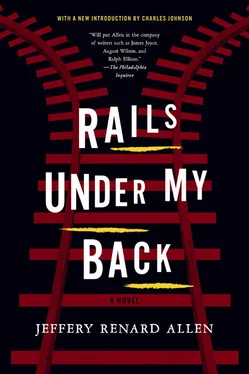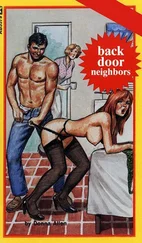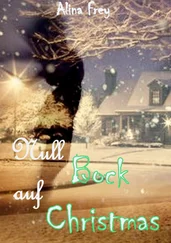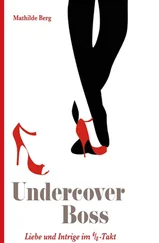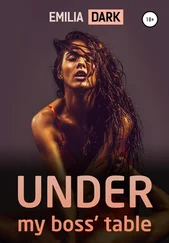If she could pull language into her mind then the memories would follow. If she said everything twice, once to get it out, then the second time for remembering, she could draw it all back to her bosom. Reel in a half-century of words. But time refused to move, this stranded horizon ship, so far off that no details reached the eye. She tried to picture its features, but her imagination did not extend to the unseen.
She knew what she must do. Pin down its shape. Rediscover time with the pulsing of its own blood. Like the raw fact of the rocking chair that fit the curve of her body. It might be the horizon itself — each rock a shift, a change, chair, horizon, chair, horizon — or possibly the water. Wood, water, wood, water, rock, water. She liked the chair, its sound, its unpillowed hardness.
How could she tell him that the past she had put away, that the other thing remained, though no longer with the staying fragrance of flowers? That now she knew, Jesus, her womb’s second survivor, had ripped open the layers of petrified sorrow, that he — invisible to their knowledge of him, blind to sight and mind — had kept his fists tight on the reins of her umbilical cord, steering her destiny, that this son had fashioned them this new house, this bludgeon which had shattered their common life. But the old line could reach the new life. Their nights together formed memories underneath their pillows, Tooth Fairy’s gifts. Their breathing remained unbroken, dawn to dawn, sunset giving away to stars, and stars to morning clouds, wheeling across day and night. All the past pounding had forged, beneath the sheets, a place remote and calm as stars laid across night sky.
She locked her eyes on him and looked inside. She pulled the inside of him out, wiped it clean, and set it before the sun, where it would receive warmth and light. His sins were now the forgotten shadows of his past, as the moment of salvation is a blinding light.
Still sun grew on green water. In the vast spread of this house, she sometimes felt she cast breaths inside a live belly. A region without light. Walls of sensitive skin. The hum of ocean. The acrid fragrance of fish. And she spent her life waiting for the whale to cut the surface of green water — a cracking of trees in the front yard — and spit her writhing from its mouth onto the shore — a thud on the front lawn.
The swinging trees rustled in a shot of unexpected wind. The sun wet her face. Her breath went short. The ache in her throat ran deep into her chest. The air’s pure scent spoke of fresh rain to come. All the old will slip away like clothes shed after her deliveries. Life having been breathed into the lungs of the dead must be taken away again before death can be returned to. As the lightning cometh out of the east. Long-winged angels lift from the brow of God. She could see them from her perpetual rocking chair. Feel the wind to come.
She rose from the rocking chair and pushed her keys deep in her purse.
THE RECTANGULAR WINDOW afforded Hatch little to look at, the walls of the tunnel like two long black brushstrokes. The train took a curve with industrious roar. The ceiling bulbs buzzed and flickered, and the cab went from light to dark, dark to light.
The concert was a month old yet so ancient that it made him cough. The almost ancient feelings reinstated themselves. Sensation lingered on his fingers. He had never told anyone what had happened that night. And I never will. Concealed like his dogtags. He and Uncle John would share this secret to the grave.
The train fast-flowed, rushing water from a hose. The city blurred past. Hatch drifted. Think of Uncle John’s spectacles, two glass river rafts. Floating down some highway. Floating over your face. And the eyes themselves, round color. Brown balls of tobacco. Or two clean circles of fire when liquor had burned away the color. Think. Think.
The train squeezed to a stop at Union Station, vast, blazing. The car emptied and filled. Continued. The car’s tubular insides mirrored the saxophone curve of Elsa’s neck. The car’s bounce, the float of her breasts.
How’s your Mexican girlfriend? Porsha said.
Puerto Rican. I told you, she Puerto Rican mixed wit —
Whatever. How come you didn’t invite her to Christmas dinner?
Well —
He hidin her, Uncle John said. In the doghouse.
He planned to meet Elsa today after his visit to Inez’s.
Why don’t you come over, Elsa said, her voice small and inviting inside the phone.
I’m sposed to spend the day wit my grandmother.
She needs the whole day?
It’s just that I don’t get to see her but once a month.
You know, Dad will be at the parlor.
I know. He’s there every day. People never stop dyin.
A soft laugh bounced from Elsa’s lips. He pictured them. It gets better, she said. Mamma will be there too.
Is that right?
She has to vacuum out the coffins, comb hair, apply makeup, paint fingernails, dress the clients, flower arrangements, that kind of stuff. Help Dad out.
I see.
So I’ll be all alone, nobody here but me and Raoul.
Raoul?
My cat.
But that would be later, much later. He had a long ride to Inez’s house in Morgan Park, the southernmost part of Central. A long ride. Elsa was hours and miles away. He flipped his book, Man and Mestizo, open. As he read, he began to feel a comfortable place inside himself where he could peek out and judge safe from penetration. Two half-pint hoodlums snatched the book from his hand, Kleenex out of a box, and frog-jumped onto the platform. They boldly flashed him their sign, thumb and index fingers curled ino a C, then blazed an escape, feet drumming across the platform fast and heavy as rainfall, nylon jackets billowing behind them as if the policing wind were clutching and tugging at their backs.
Slow-moving silence. Hatch stirred in his seat. He could feel the eyes of the other passengers on him. His tongue dry and stiff in his mouth, a dead rat. A bad way to start the day.
He closed his eyes and invented his own darkness. And he roamed in this private space while the train pushed like a diver through tubular black. It rose — he saw it and felt it — and tilted him out of his thoughts. The morning pushed hot through the moving window. Opened him. The train sped. Distance changed kind. He tried to ignore the melting of familiar landscapes: crowded streets, a river lake-still and lake-steady to cast reflection, and the sun-catching skyscrapers and flag-decked buildings at the city’s heart.
The train spat him onto a wooden El platform. He spiraled down three flights of stairs to earth. The light was slower here in Morgan Park. The sun sprayed lazy light in banks of red discs. Through the hot grit of day, he took deep-reaching steps for the bus stand.
AHHHHHHHHHH
Shut up.
Ahhhhhhhhhh
Shut up. I’m tellin you.
Ahhhhhhhhhh
Wait til we get home. I’m gon whip yo butt. You won’t be hollerin tomorrow, no sir.
Ahhhhhhhhhhh
What you cryin for? Talk. I don’t understand what you sayin.
Ahhhhhhhhhhhh
Ahhhhhhhhhhhh. I can holler too. Ahhhhhhhhhhhh
Ahhhhhhhhhhhh
No sir, won’t be hollerin tomorrow. I’m gon tear yo butt up … Don’t stop now. Might as well finish cryin. We got only three more blocks.
The toddler resumed crying.
Shut that baby up, Hatch said. In floating bus space, he rocked slightly in his seat.
What? You come up here and make me, punk.
Ahhhhhhhhhhhhhhhhhhhhhhhhhhhhhhhhhhhhhhhhhhhhhhhhhhh
Jus get the fuck off.
You make me, punk. Bitchass nigga.
Читать дальше
